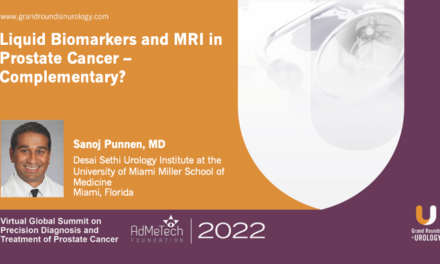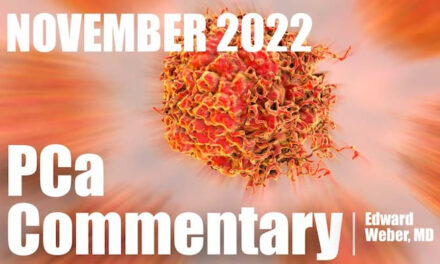Eric M. Rohren, MD, PhD, presented “Advances and Controversies in Theranostic Approaches to Prostate Cancer” at the 27th Annual Innovations in Urologic Practice conference on September 23, 2023.
How to cite: Rohren, Eric M. “Advances and Controversies in Theranostic Approaches to Prostate Cancer.” September 2023. Accessed Aug 2025. https://grandroundsinurology.com/advances-and-controversies-in-theranostic-approaches-to-prostate-cancer/
Advances and Controversies in Theranostic Approaches to Prostate Cancer – Summary
Eric M. Rohren, MD, PhD, analyzes how theranostics—combining therapeutic and diagnostic processes—are reshaping prostate cancer management. For example, prostate-specific membrane antigen (PSMA), used as a biomarker for both imaging and targeted therapy in PSMA-targeted PET scans, offers precise tumor localization, significantly enhancing diagnostic accuracy. PSMA-targeted radiopharmaceuticals such as 68Ga-PSMA-11 for PET imaging and 177Lu-PSMA-617 for therapy have been shown to improve detection rates and treatment outcomes, particularly in metastatic and castration-resistant prostate cancer.
Despite these advancements, Dr. Rohren acknowledges the challenges in theranostic approaches. The variability in PSMA expression among patients can impact the effectiveness of both imaging and therapy. Additionally, he discusses the potential side effects and toxicity associated with radioligand therapy, emphasizing the need for careful patient selection and monitoring.
Dr. Rohren also explores the ethical and regulatory considerations in the adoption of theranostics. He highlights the need for standardized protocols and guidelines to ensure consistent application and patient safety.
About The 27th Annual Innovations in Urologic Practice:
Presented by co-chairs Mohit Khera, MD, MBA, MPH, and Michael Coburn, MD, FACS, the Innovations in Urologic Practice conference provides a detailed review and commentary on multiple genitourinary and urologic diseases. Among the featured oncological topics are bladder cancer and immunotherapies, as well as upper tract cancer management, prostate cancer, including state-of-the-art imaging, focal therapy, and MRI. Experts also discuss new tools and techniques for nephrectomy and treating advanced renal cell carcinoma. In terms of general urological approaches, the conference also includes pelvic reconstruction and trauma; men’s health topics like male infertility, andrology, and sexual dysfunction; OAB and voiding dysfunctions; and ways to diagnose and treat infections in the urology patient.
For further educational activities from this conference, visit our collection page.
ABOUT THE AUTHOR
Eric M. Rohren, MD, PhD, FACR, is professor and chair of the Department of Radiology at the Baylor College of Medicine in Houston, Texas. Dr. Rohren earned his MD and PhD from Mayo Clinic in Rochester, Minnesota, where he also completed his internship. Dr. Rohren completed a residency in diagnostic radiology and a fellowship in nuclear medicine at Duke University in Durham, North Carolina.
Dr. Rohren has served on numerous boards and committees in the nuclear medicine field, including the Society of Nuclear Medicine and Molecular Imaging’s PET Center of Excellence, the Radiology Society of North America, and the American College of Surgeons – Commission on Cancer. Dr. Rohren was on the board of directors of the American Board of Nuclear Medicine, serving as chair of the board from 2013-2014. He is currently a chancellor for the American College of Radiology (ACR) and serves as the chair of the ACR’s Nuclear Medicine Commission.
A frequent national and international speaker with over 100 peer-reviewed publications, Dr. Rohren is a recognized expert in PET imaging, nuclear medicine, and theranostics. His professional interests include the complementary roles of functional and anatomic imaging in the assessment of malignancy, novel radiopharmaceuticals for the imaging and treatment of cancer, emerging applications of positron emission tomography–magnetic resonance (PET/MR), and molecular brain imaging for evaluation of neurocognitive disorders.





